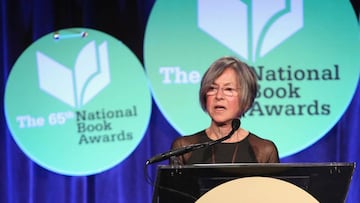Who is Louise Glück, winner of the 2020 Nobel Prize in Literature?
The American-born 1993 Pulitzer Prize-winner has been awarded one of the year’s top literary prizes for her “unmistakable poetic voice”.


The 2020 Nobel Prize for Literature has been awarded to 77-year-old American poet and essayist Louise Glück. The prize is based on a lifetime of literary work and is voted on by members of the Swedish Academy, comprised of members of literature academies and societies, who choose their favourite writer from a list of five candidates.
On awarding Glück with this year’s award, the organisation said that she had been recognised for "her unmistakable poetic voice that with austere beauty makes individual existence universal”.
BREAKING NEWS:
— The Nobel Prize (@NobelPrize) October 8, 2020
The 2020 Nobel Prize in Literature is awarded to the American poet Louise Glück “for her unmistakable poetic voice that with austere beauty makes individual existence universal.”#NobelPrize pic.twitter.com/Wbgz5Gkv8C
Who is American poet Louise Glück?
Louise Glück was born in 1943 in New York to parents of European Jewish descent and grew up on Long Island. Her father had held ambitions of becoming a writer himself and Glück began writing poetry at an early age after hearing tales of Greek mythology from her parents.
She developed anorexia nervosa in her teens and began psychoanalytical treatment during her senior year of high school. Her illness prevented her from focusing on her studies full-time after leaving school but she did take a poetry class at Sarah Lawrence College and enrolled in poetry workshops at Columbia University’s School of General Studies.
What are her most notable works?
In 1968 she published her first book of poetry, Firstborn, and began to build a reputation as a promising writer with a penchant for disaffected, isolated narratives. Her 1975 collection The House on the Marshland showed the real emotional depth of her work.
Glück was awarded the 1993 Pulitzer Prize for her collection The Wild Iris, which Publlishers Weekly described as an “important book” full of “poetry of great beauty”. It drew praise from Helen Vendler of the New Republic who noted: “It was not a voice of social prophecy but of spiritual prophecy—a tone that not many women had the courage to claim.”
Mental health writer Matt Haig has previously spoken about his love for the poem Snowdrops from The Wild Iris collection.
In 2012, at the age of 69, she published the career-spanning Poems 1962-2012 to universal acclaim. It was described in the New York Times as “a major event in the country’s literature, perhaps this year’s most major”.
How did Twitter react to the awarding of the 2020 Nobel Prize for Literature?
So significant in the history of American literature is Glück that a number of hugely-respected writers have praised the decision in recent hours. Mary Karr, author of Pulitzer-nominated Tropic of Squalor, recounts a formative meeting with her while still a young writer.
Thrilled to hear #LouiseGluck took the poetry Nobel. In grad school, I told her if I had a choice between being a poet & being happy, I’d choose the latter, and she said, ‘Oh don’t worry. You don’t have that choice.’ Felt like a blessing. All honor to her!https://t.co/jPhHTzcC26
— Mary Karr, Author (@marykarrlit) October 8, 2020
The melancholy of her work was often mentioned by those paying tribute to the Nobel Prize winner and Jia Lynn Yang, editor at the New York Times, remembers a particularly emotional performance of Glück’s Lamentations.
Years ago the poet laureate Robert Pinsky did a wonderful project where he asked everyday Americans to pick their favorite poems.
— Jia Lynn Yang (@jialynnyang) October 8, 2020
One of the most memorable, from a woman in Seattle, was Lamentations by Louise Gluck. It's heart stopping. https://t.co/Ol262xgJzi
Related stories
But her work could also be incredibly positive and New Yorker editor Michael Luo chose to post this uplifting extract from her poem President’s Day.
Louise Gluck, Nobel winner, in @NewYorker: And yet moments ago
— Michael Luo (@michaelluo) October 8, 2020
the sun was shining. How joyful my head was,
basking in it, getting to feel it first
while the limbs waited. Like a deserted hive.
Joyful—now there’s a word
we haven’t used in a while. https://t.co/bE3NOFZEv3